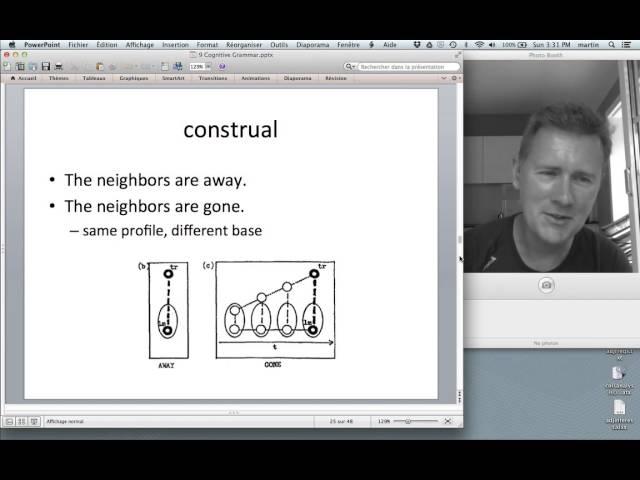
A course in Cognitive Linguistics: Cognitive Grammar
Комментарии:

Deixis sounds like the collective noun for masculine presenting lesbians. I'm dead. 😂
Ответить
vielen vielen Dank es ist sehr usefull
Ответить
I really thank you a lot and you are helping us a lot
Ответить
One of the best lectures on Cognitive Grammar! I have learned a lot from this video class. Thank you for making the topic easier to understand.
Ответить
what is the conceptual space of "space"?
Ответить
watched the video again today. very clear elaboration on the key terms of CG. Thanks!
Ответить
love it. Electricity -that stuff which goes along wires that stuff somes it up - thankyou
Ответить
Thank you for your efforts, you are such a great man. Whenever I come across any new linguistic theory and find a video for you, I feel relieved. May Allah guide you to the right bath.
Ответить
Can Cognitive Grammar tell me why, 'I like being out in the open' is regular and *'I like being in out the open' is anomalous? That is what I need in a grammar!
Ответить
I care about one thing above all else...with each of these theories, how do we situate them, prioritize them, and make use of them? or is all just 'up to the reader' and thus...it's just a mess of relativity, arbitrary and 'you do yours' and 'I'll do mine'.
Ответить
I have a question and I'll be more glad if you answered or helped! So, I'm a pre-masters student and my professors - so unfortunately - are not helping as expected. So the question is: as a pre-master scholar, do I need to read all references concerning branches and approaches in linguistics? Or what should I do? Is it supposed to be only reading about the subject? Because I feel SO lost. Thanks!
Ответить
You deserve so much more credit for these videos. I love what you do. Thank you.
Ответить
Hello Mr. Hilpert, is it true that this video doesn't include the parts 'mental interactions' and 'action-chain sequences'? I would appreciate an explanation of these two categories. Thank you:)
Ответить
Thank you very much for the wonderful lecture. I'm in holidays now waiting my master in second language acquisition to begin so my professor recommended me to read the books 'foundations of cognitive grammar'. He told me that it is going to be such a tough work to comprehend the contents so I was a little bit scared to get started, but now I'm very motivated to start my journey! I will go to a bookstore tomorrow. Thank you as always, Dr. Hilpert. I appreciate your efforts.
Ответить
Hi Mr.Hilpert, thank you for your amazing video, I learned a lot of concept from your courses!!!
I have a question, are "target" and "trajectory" same things? also "landmark" and "reference point" same things?
I often see similar diagrams, but the namings are different...

Amazing video. Thank you, Dr. Hilpert. I have read the two books by Langacker several times but tend to be lost in lines. The last time I read them was after I watched this video. Believe me, you have made my life much easier. Here I am, watching this video again because I am trying to popularize cognitive linguistics to middle school English teachers in China. To share some of my experience with you, when teaching a theory to people who have no linguistic background, I find it necessary to break the sequence of knowledge presented in the books. For example, it is actually easier for my students to understand cognitive grammar if I teach them something from Book II before I teach them things in Book I. I guess the structure of learning a subject is different from the structure of the knowledge in this subject. I hope I have expressed myself clearly.
Ответить
Everything I've read and heard so far goes a bit like this: So, what is Cognitive Grammar? Response: ten paragraphs with definitions with the word cognitive in it. Bit like asking: What is a tree? Response: It's a tree bascially. I'll keep going though.
Ответить
Fascinating explanation. Thank you so much!
Ответить
Explained very well. Thanks a lot. 🇵🇰
Ответить
Thank you very much sir, this is REALLY helpful.
Ответить
The passive voice is an example of a "neutral" grammatical form that actually has pragmatic and semantic meaning. In Japanese the passive voice form in "I was kept-cried by the baby" is also a marker of inconvenience (Breen). The English double transformation [convert to passive -> then, drop the agent] results in a standard form of deliberate obfuscation - for example a senior management writing a safety manual which has the entry "Employees will be made aware of occupational health issues relating to their workplace." (Indirectly, "WE are NOT taking personal financial liability on this one".
Just as the Zulu noun counter system is not the same as the Latin gender system (Lakoff), the case system and mood markers of Latin or Sanskrit do not line up with Tagalog "equivalent" structures where there are 5 different word order transformations depending on the focus of the sentence. Also, in many Austronesian languages - partly due to obscure morphophonological changes in the past - the form of the transformed verb is a lexical item and not something that children could easily recreate.

I really appreciate the help with these videos you're doing but I do have a question remaining, the thing is that for my linguistics class my teacher asked us to explain from a standpoint of both cognitive grammar and cognitive linguistics, how is a lapsus linguae perceived as? As in for those two disciplines how is that phenomenon viewed and/or explained as. Thanks in advance, have a nice day!
Ответить
Thank you for this excellent introduction. This is a perfect video to share with friends who might be curious to get started with Cognitive Grammar.
Ответить
A great lecture, clear and simple examples. :)
We are using some of your papers in the course on Modern cog.ling theories in our English department in Nis, Serbia :)

it sounds good but I can't not understand words without caption😅
Ответить
Thanks a lot! This playlist and your whole channel are so useful!
W.r.t. what you say after "grounding", as a first-year MA student in linguistics with a non-linguistics background, I find Cognitive and Constructional approaches to be way more easier to understand than any TGG approach besides context-free PSGs and maybe OT. After a year of self-teaching and half a year of MA classes, I still don't understand, let alone grok, anything that came after Aspects. But with CxG and this, I don't even need to try to understand, it all feels that natural.

Where you come from Martin, I'm studying theoretical grammar, I'd like to share some experience
Ответить
Thank you a lot for the lecture! Everything is very well explained!
Ответить
thankyou Hilpert Sensei
Ответить
Very good video! Thanks very much
Ответить
Thank you for the good lecture. I can understand more easily about the cognitive linguistics through this.
Ответить
This was great, thank you!
Ответить
Jesus man, you earned a subscription. This was a heavy but so worthwhile lecture, thank you so much. I bet you just turned your computer off as soon as you finished this!!
Ответить
Thank you for this lecture.
Ответить
Thanks for the help :) I wish you were my teacher xD
Ответить
Another awesome lecture, Mr. Hilpert. You have, without a doubt, done a very good job grounding the complicated terms of cognitive grammar in our minds. Thank you so much!
Ответить
Helped me a lot, thanks Mr. Hilpert
Ответить
please help me to understand how to explain simple and complex sentence structure through cognitive linguistic.
Ответить
Why couldn't "to run" be a region in some domain of conceptual space? Say, in the domain of the ways in which you can move your body or whatever? Or "quickly" - for that matter?
Ответить
I've only just started finding my way around cognitive grammar, but it seems surprising that perfective events (such as "the bridge collapsed") should be construed as processes.
Huddleston/Pullum (2002)
"With perfective aspectuality, the situation is presented in its totality, as a complete whole; it is viewed, as it were, from the outside, without reference to any internal temporal structure or segmentation."

Hope more videos about cognitive grammar. thank you.
Ответить
I definitely recognize the chin-scratching scenario :-)
Ответить
















